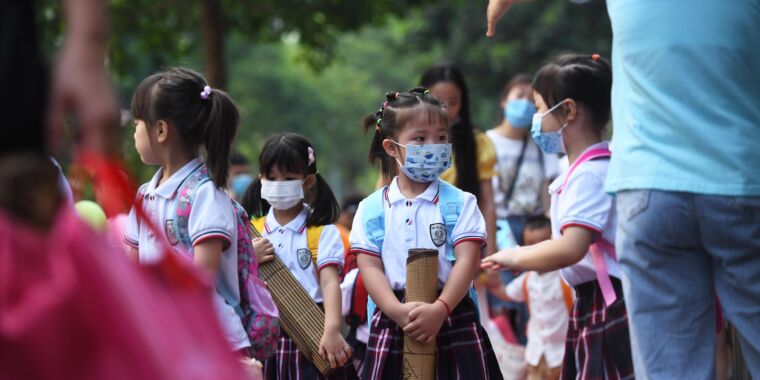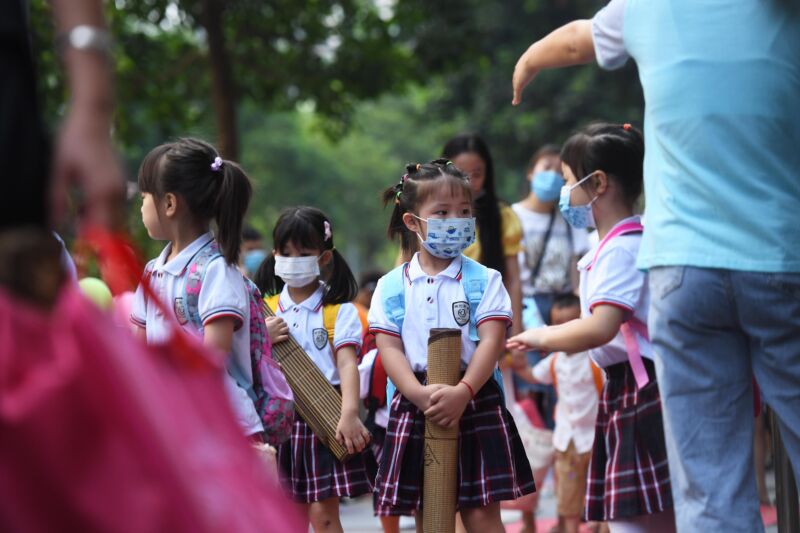
Grab your tissues–.
In coronavirus’ wake, garden-variety bacteria may come roaring back.

Enlarge/ Children go back to kindergarten following COVID-19 lockdown.
In our cushy COVID bubbles, our body immune systems may be getting soft.
Physical distancing, lockdowns, masking, and spirited sanitizing all indicate we are entering into contact with less garden-variety bacteria than typical. This year’s flu season was essentially cancelled.
While that might look like a welcome reprieve from seasonal conditions and pesky sniffles, professionals fear that our body immune systems might be losing their protective edge in the lull. And with the usual tiny suspects lying in wait for our return to some sense of normalcy, it might imply that nasty bursts of common colds and flu-like illnesses are in our post-COVID futures– ones that might not be preventable even if we continue with a few of our COVID precautions.
That appears to be what played out in Hong Kong.
” Staff and students used face masks at all times; lunch hours were cancelled, desks were spaced out, and group activities were limited,” the scientists noted.
Still, by the end of November, the researchers tallied 482 break outs of upper respiratory infections in schools.
When scientists took a look at laboratory testing on the particular germs behind the snotty rise, they discovered no infections from the unique coronavirus, SARS-CoV-2, and no infections with influenza viruses. Instead, the testing indicated rhinoviruses and enteroviruses– culprits of the common cold and other similarly mild infections.
Roaring back
The researchers assume that the burst of annoying bugs was substantiated of immune actions in the children subsiding while in-person learning was largely closed down in between January and late September. A cross-sectional survey had earlier suggested that 75 percent of school kids did not have contact with individuals outside their households while they were out of school.
As cases of colds and flu-like illnesses dropped during that time, “population vulnerability to rhinoviruses and other respiratory infections, including influenza infections, may have been increasing gradually since persons were likely less exposed to the infections when intense social distancing measures, consisting of school terminations, were carried out in reaction to the COVID-19 pandemic,” the researchers recommend. “This would have increased transmission potential when schools resumed.”
They note that a comparable rise in typical colds was seen in grownups in England a few weeks after schools resumed there in September.
” Nonpharmaceutical interventions may differ”
As for how the infections still handled to spread with the COVID-19 safety measures in place in the reopened schools, the scientists have another hypothesis: generally, COVID precautions don’t work well against common cold germs. For example, face masks have actually been shown to successfully obstruct coronaviruses and influenza infections– but they’re less reliable at obstructing rhinoviruses And rhinoviruses are hardier than coronaviruses and influenza infections when it concerns holding up against disinfectants.
Generally, various breathing infections utilize the very same set of transmission modes (surfaces, breathing beads, and so on), however “just how much each mode adds to transmission of a specific virus stays uncertain; for that reason, the efficiency of certain nonpharmaceutical interventions might vary between infections,” the researchers write. To put it simply, masks and disinfection might be extremely effective versus influenza viruses and SARS-CoV-2, but they may not be as effective against your basic snotty-kid germs.
” Our findings highlight the increased danger positioned by typical cold viruses in locations where schools have been closed or dismissed for extended durations during the COVID-19 pandemic,” the researchers conclude.
No comments:
Post a Comment